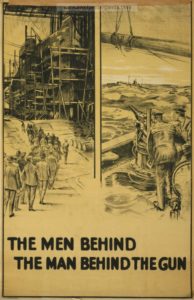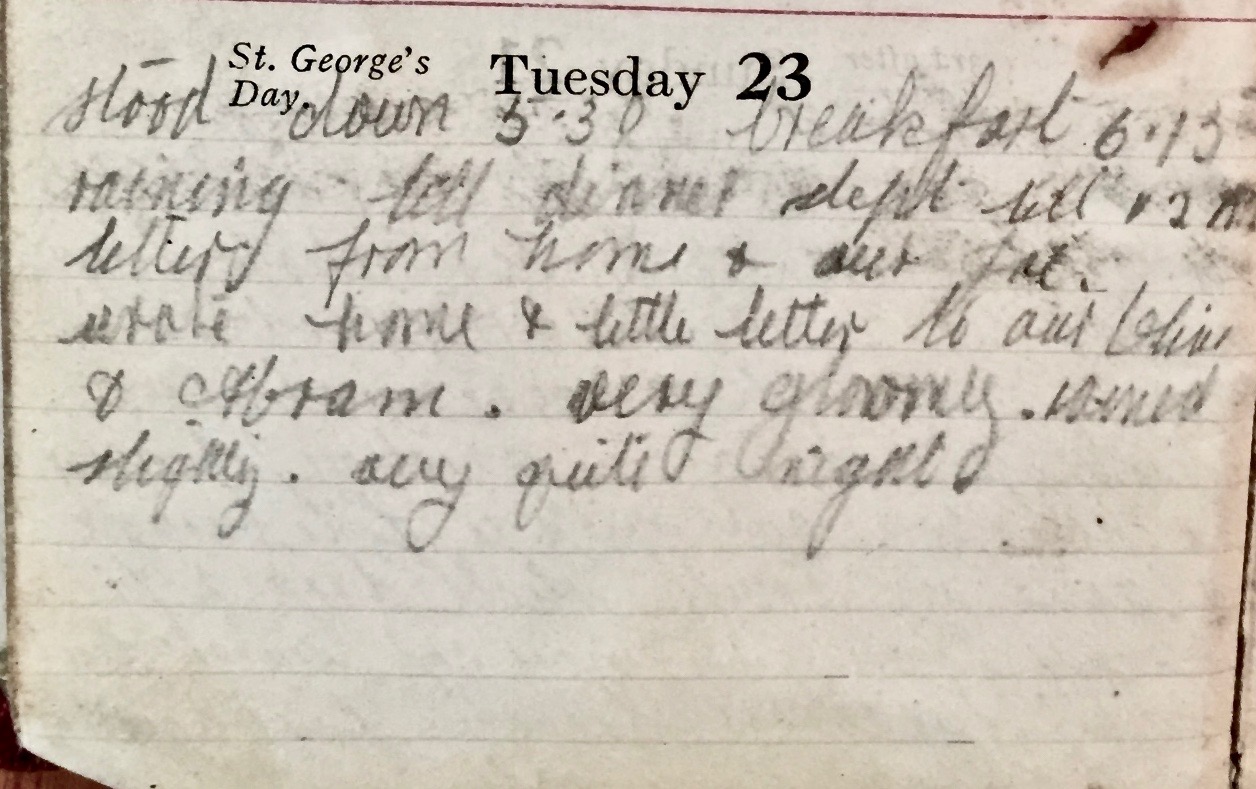Tuesday April 23rd, 1918
Stood down 5:30. Breakfast 6:15. Raining till dinner. Slept till 12. Letter from home and our Joe. Wrote home & little letter to our Olive and Abram. Very gloomy. Rained slightly. Very quiet night.
Family
Today Frank writes home and sends other letters to his brother-in-law Abram and his daughter Olive. He also receives letters from Sarah, his wife, and his older brother Joe. Joseph Simpson Whitehead was born in 1873 and would have been 41 when war was declared. This month, with the changes in the upper age for conscription to 50, Joe, now 45, will be eligible to be called up.
The Military Service Bill
The Military Service Bill, being rushed through Parliament this month, is designed to secure more men for the forces. It has a variety of strategies: to raise the upper age for conscription; to comb out men from non-essential occupations; and, most controversially, to extend conscription to Ireland. There is significant debate on all three:

There is a concern that conscripts between 41 and 51 will not be the able bodied men that are needed for combat. ‘Speaking in the debate yesterday, Sir Donald Maclean, the Deputy Chairman of Committees and a much-respected member of the House, gave it as his opinion, based on his experience in the work of tribunals, that out of a block of 500,000 men who might come under the operation of the Act the Government would not get more than 3 percent of anything approaching real military value.’¹ This was countered by the Government’s claim that, ‘… the first result of their enlistment will be to release all the younger men engaged in home defence and in other military duties at the depots. A stream of drafts will set in towards the theatre of hostilities almost immediately.’²
The poster shows both workers going to the shipyards and the Royal Navy in combat – emphasizing the importance of both.* Under the new legislation, the manpower for a few critical war-related industries, including shipbuilding are still protected, others are not. These industry are concerned that ‘combing out’ their employees will damage production, thereby harming the strength of the national economy needed to successfully prosecute the war. ‘Sir Auckland Geddes, the Minister of National Service, declared bluntly … [that the] proposal involved ‘death and disaster for many industries in this country’. ‘But’ he added, ‘that was a less evil than death and disaster to the nation as a whole.’¹
Conscription to Ireland drew huge opposition from across the world and dominated the newspapers commentary for several months. Irish nationalists clearly opposed it, decrying their lack of self-determination. The Catholic Church were vocally and actively opposed to it, supporting various actions including strikes, and, when things got heated, forcing the Pope to defend his senior Irish clergy’s position. American Irish even approached President Wilson to intercede. While the bill passed to law with Irish conscription enabled, it was never enforced.³
Our Joe
Some commentators believe that the Act’s provisions were in anticipation of the needs of the War in 1919. We have not found any evidence that Frank’s brother Joe was ever conscripted. He will die in February 1928, leaving an estate of £152 to his widow Alice.
13th (Service) Battalion War Diary – 23rd April 1918 – Crow Hill
Our artillery was moderately active, enemy only fire 4 HE and 7 shrapnel on our sector in the night. 2Lt J Fazackerley and 4 OR left the Dirk at 23:30 hrs and proceeded via Modder Ravine and Lancaster Hill to Kimberley Spur. Patrol worked along western slope just below crest for approximately 450 yards. Here two men were left. The Officer and 2 OR moved on and were evidently observed as two rifle shots were fired at them from a post judged to be 250 yards to their left. Patrol proceeded no further as a full moon rendered visibility very good. It tried to fix the position of the post by sound but was unsuccessful.
Another patrol of 4 OR which lay up for half an hour at the south of Dautli then move to the NW of the village. Seven or more of the enemy were suddenly seen near a large house. The patrol got down at once and as the other party commenced splitting up, it feared becoming surrounded, it therefore withdrew again into the open south of the village at 02:45 hrs. Enemy did not come into the open so patrol withdrew to our lines. One man of the enemy party wearing an overcoat was taken to be an officer.
Visibility was very low most of the day but the usual amount of movement in the usual spots was seen. A noticeable amount of work has been done on Flat Iron Hill and the trench at the bottom of W slope of Spotted Dog deepened as movement is now less visible in them.
References & Further Reading
¹ ‘The Military Service Bill’, the Guardian newspaper, April 11th, 1918, page 4
² Article in the Observer, April 7th, 1918, page 3
³ various articles in the Guardian newspaper, April & May 1918
* Poster from WWI Propaganda Posters site. Image may be subject to copyright.


